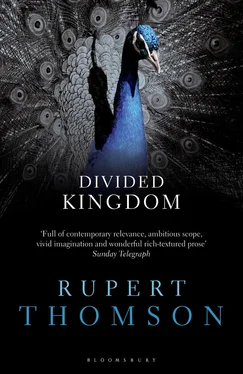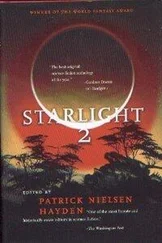That night we ate pork that had been roasted on a spit, and we drank juice made from crushed apples, and we were allowed to go to bed an hour later than usual, on account of it being such an important occasion.
On the following Monday classes began in the old ballroom. Along one edge of the room four windows stretched from floor to ceiling. Through their watery, distorting glass I could see the formal garden with its lawn, its box hedges and its gravel paths. The other side of the ballroom had been panelled in wood and painted a delicate shade of green. Set into the panels, and echoing the windows in their dimensions, were four mirrors in which the light that flowed in from outside seemed to deepen and shimmer. At the far end of the room stood a low stage where string quartets or dance bands would once have played. Sometimes I would catch a glimpse of a trombone in the shadows, or the curve of a French horn, the brass perfectly smooth and glowing, like honey poured over the back of a spoon, and sometimes the air would rustle at my elbow, a flurry of movement that only lasted a second, as if a girl in an evening gown had just whirled by. I never felt the room was haunted. I simply thought it had seen happier days, livelier days, and that traces of that time remained, as the smell of toast or bacon will linger in a kitchen long after breakfast is over.
Desks had been arranged in rows on the parquet floor, and we were seated alphabetically. My name being Micklewright, I found myself between Maclean and Abdul Nazir. Nazir was always crying, or on the point of crying, the dark sweep of his eyelashes permanently clogged with tears. I hadn’t cried at all except for once, on Christmas Eve, after the carols, but I’d had no sightings of my parents since that night. There was something in me, perhaps, that couldn’t stand it. Couldn’t stand to be reminded. I often had the feeling, looking at Nazir, that he had taken on the burden of my sadness, and that he was crying not just for himself but for me too. As for Maclean, he didn’t seem remotely upset. If I caught his eye, he would flick paper pellets at me. He had long bony wrists, and both his ears stuck out like the handles on a sporting trophy. Our teacher was the stout but enthusiastic Miss Groves. Sitting beneath crystal chandeliers, frowned down upon by several gilt-framed portraits of men in armour, we were to learn about the new political system that had come into being, and why the government official thought we were so special.
On our first morning Miss Groves taught us about our country’s recent history. It had become a troubled place, she said, obsessed with acquisition and celebrity, a place defined by envy, misery and greed. Crime was rampant: the courts were swamped, the prisons overflowing. Divorce followed marriage as quickly and predictably as teenage pregnancies followed puberty. Homeless people slept in every doorway, ditch and underpass. Racism was more widespread and more firmly rooted than ever before. Violence lurked round every corner. It wasn’t just a matter of grown-ups killing grown-ups. Children were killing children. With the police force woefully undermanned, people had started taking the law into their own hands. If you didn’t like the way somebody drove, you smashed his headlights with a jack. If you had a suspected child molester living in your neighbourhood, you lynched him. If a burglar broke into your house, you shot him dead. For decades, if not for centuries, the country had employed a complicated web of manners and convention to draw a veil over its true nature, but now, finally, it had thrown off all pretence to be anything other than it was — northern, inward-looking, fundamentally barbaric.
It had been a time for extreme measures, Miss Groves went on, two smudges of pink colouring her cheeks, and the government had not flinched from its responsibility. The Prime Minister and the members of his cabinet had met in secret chambers, far from the eyes and ears of the electorate. Down there — for the chambers were underground, relics of a war that had been fought roughly half a century before — they talked, they argued, they even wept, and in the end they reached a decision: they were going to do something bold, something extraordinary … In our makeshift classroom, we were breathless with anticipation. Miss Groves told the story so well, with such a gripping command of atmosphere and detail, that we could hardly wait to find out what happened next. At this point, however, she stepped back.
‘See you here at nine o’clock tomorrow,’ she said.
We were there, of course. We were even early. We were going to school, we were being taught history, of all things, but at the same time we were learning about ourselves, what had happened in the recent past and what would happen in the near future. Our lives had become books that we couldn’t put down.
What the government had decided to do, Miss Groves told us on that second morning, was to reorganise the country’s population — the entire population, from the royal family down. She paused. It was a lot to take in. We had probably heard the word ‘rearrangement’, she went on. Well, that was the name they had given their initiative. They divided the population into four distinct groups, not according to economic status or social position, not according to colour, race or creed, but according to psychology , according to type. How had they defined types of people? Miss Groves turned to the blackboard and wrote THE HUMOURS in block capitals. She asked whether any of us knew what the words meant. No one did.
For almost two millennia, she said, from Hippocrates onwards, medicine had been based on the idea that there were four bodily fluids or humours — black bile, yellow bile, blood and phlegm. I glanced at Maclean. We both wrinkled our noses. But Miss Groves had already faced the blackboard again, and she was drawing a large circle, which she proceeded to divide into four equal sections. She wrote BLACK BILE in one section, YELLOW BILE in another, and so on, until each section contained a humour. It was then that a boy called Cody interrupted her.
‘What about piss, Miss Groves?’
Laughter skittered through the ballroom, a brittle, breathy sound, like leaves being blown across a floor. Leaves that were dead, though. Miss Groves swung round. Her face was stiff, and all the colour had drained from her lips and cheeks.
‘Who was that?’
Cody put his hand up. ‘It was me, Miss. I wanted to ask about urine. Isn’t urine a bodily fluid?’
He had something of the fox about him, I’d always thought, his brown hair tinged with red, the cast of his features alert, sardonic, sly.
‘Leave the room, Cody. I’ll deal with you later.’
All eyes followed Cody as he stood up and walked to the door.
‘Any other questions?’ Miss Groves said.
I stared at the scarred lid of my desk, my heart beating hard, my throat dry. I felt Miss Groves’s gaze pass over my head like a searchlight’s penetrating beam.
‘I want you to imagine,’ she said carefully, her voice still drawn tight, ‘that the circle is your body. Imagine your good health depends on the correct, the judicious , balance of all the humours. Once you’ve imagined that, then let the idea expand. Imagine the circle is the whole country — the body politic, as it’s sometimes called.
‘You see’ — and she stepped towards us, enthusiasm rising in her once again — ‘the theory of the humours is built on notions of harmony and equilibrium, and these were the very qualities that were lacking in the country prior to the Rearrangement. In the deep and distant past doctors used humoral theory to address all kinds of human ailments, everything from physical infirmity to moral imperfection. All of a sudden, though, it was the body politic that needed treatment.’
Читать дальше












